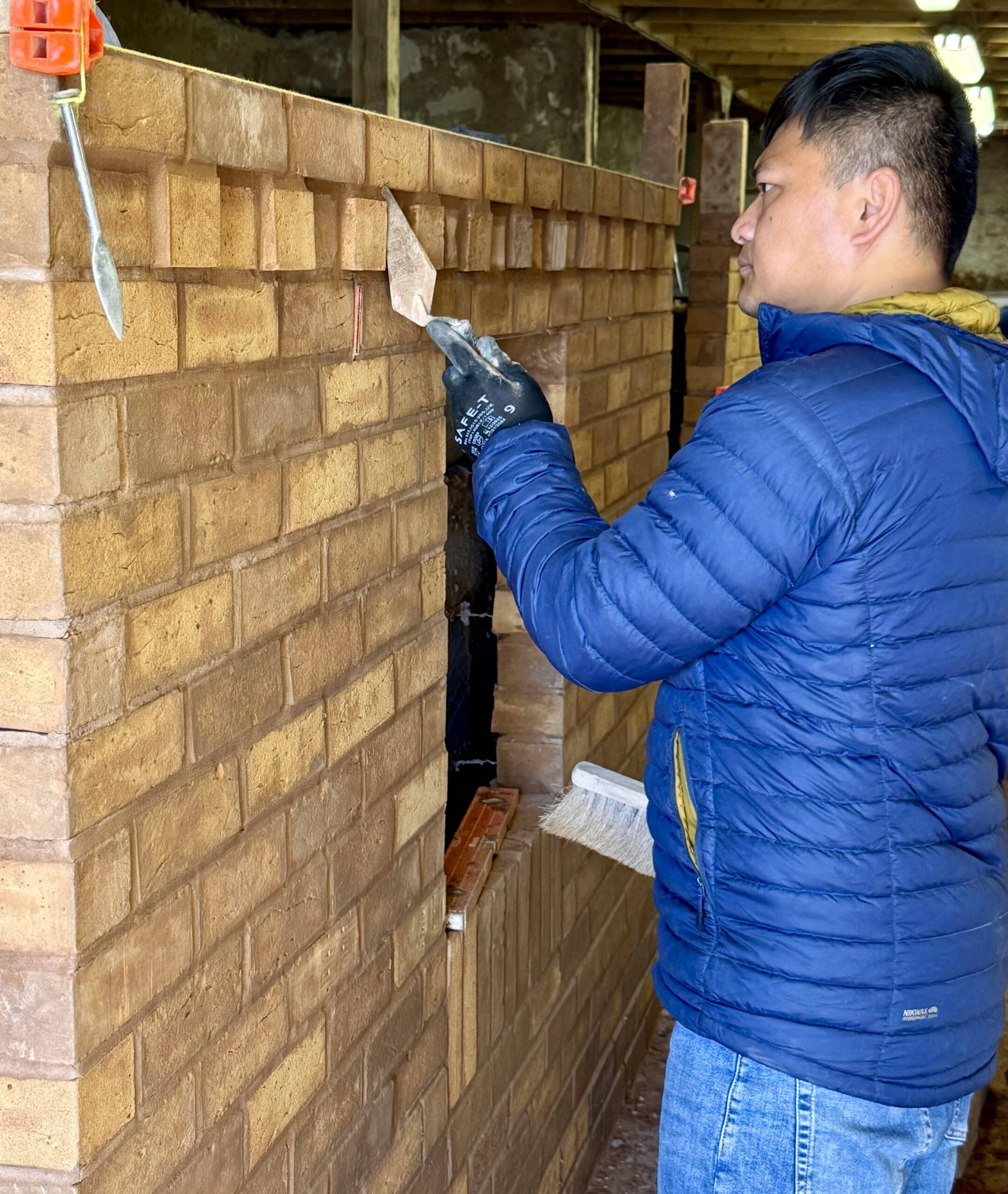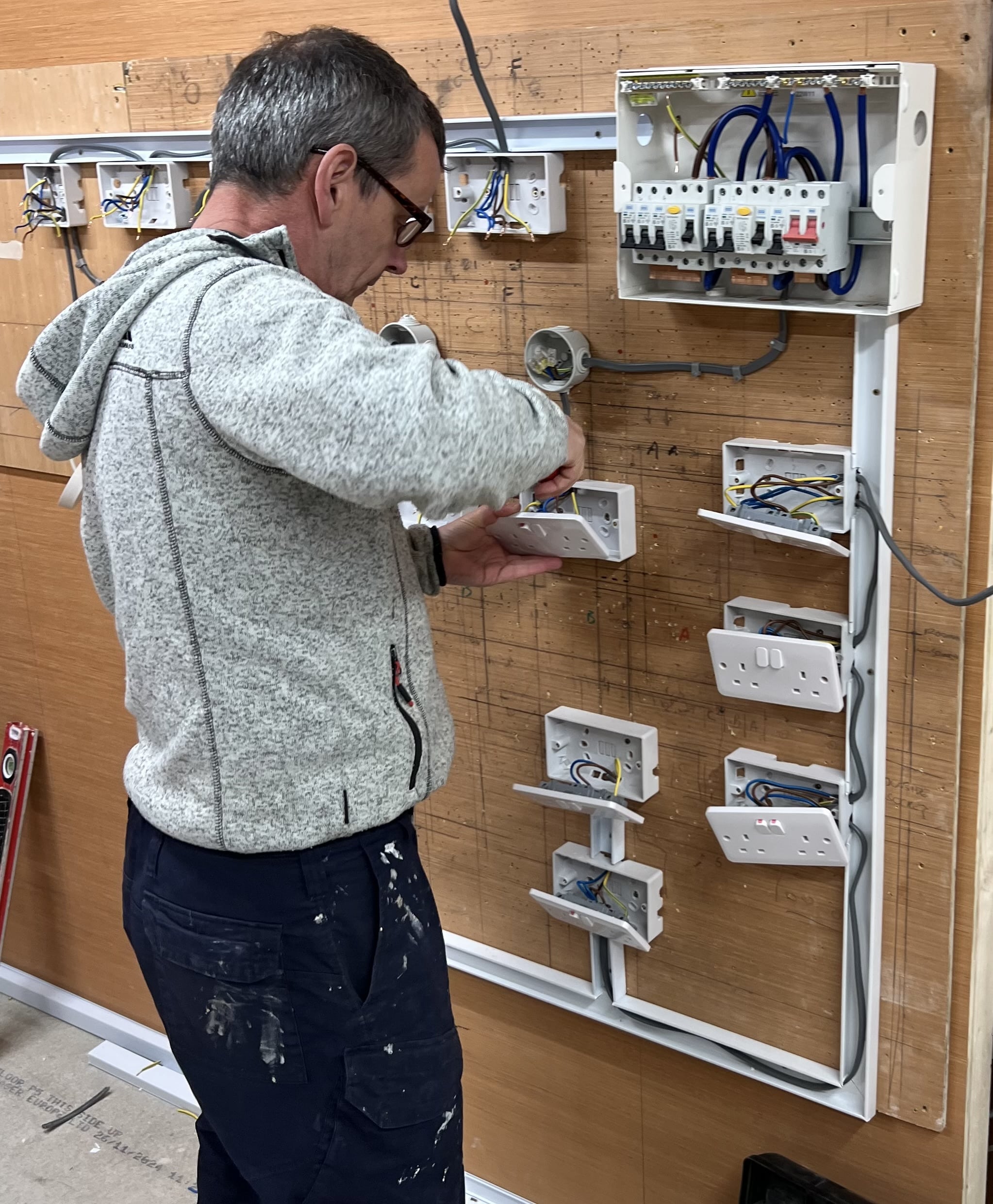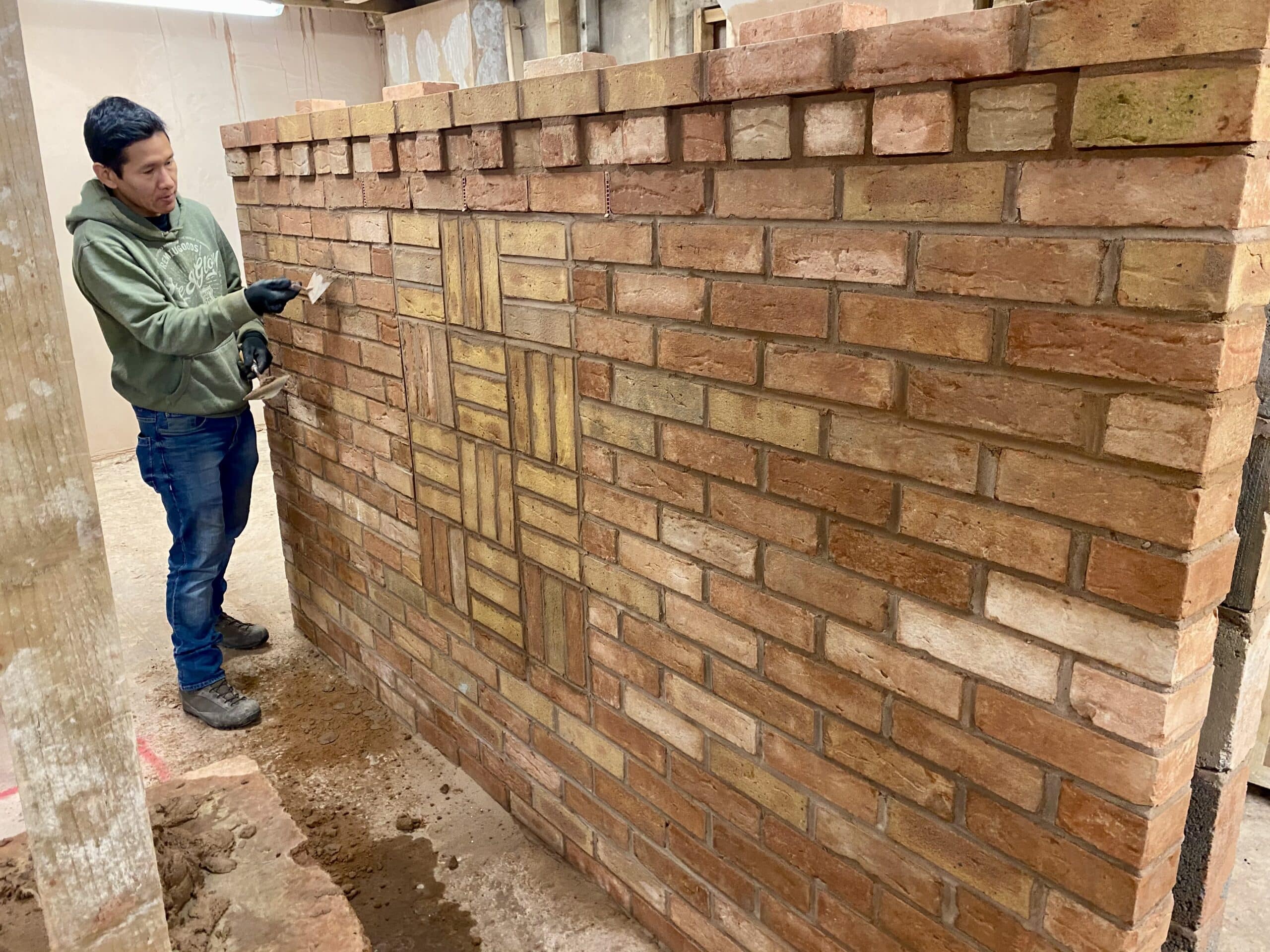Level 3 Certificate in Building Installation and Property Maintenance Skills – 4 Trades
This course is ideal for service leavers wanting to learn 4 trades to work in property maintenance and complete work in...














You will complete training in 6 trades to achieve the Level 3 Diploma in Building Installation and Property Maintenance Skills, chosen from: plastering, plumbing and heating, wall & floor tiling, carpentry, kitchen fitting, bricklaying, and electrical installations.
To make full use of ELC funding, most service leavers complete the programme over two financial years. In the first year, learners typically complete three trades to achieve the Level 3 Certificate, then complete a further three trades in another financial year to progress to the Level 3 Diploma.
This course is designed for individuals working toward a Level 3 Diploma. To achieve the diploma, you will complete training in six trades, giving you a strong, versatile skill set to carry out a wide range of building, installation, and property maintenance tasks.
Customise Your Course to Fit Your Goals
You can choose which trades you want to complete to achieve your level 3 diploma (must be different to the 3 you completed for your level 3 certificate):
Training is delivered at our purpose-built centre in Stoke-on-Trent, Staffordshire, with local accommodation available for those travelling from further afield.
Courses are taught over two consecutive weeks, but if needed, you can choose to complete your training in separate blocks over a 12-month period.
Nationally Recognised Level 3 Qualification
Upon successful completion, you will be awarded the AIM Qualifications Level 3 Certificate in Building, Installation and Property Maintenance Skills. This qualification:
We’re proud to have trained over 2,220 learners using ELC funding, and our feedback speaks for itself—with an average 97% satisfaction rating from 1,518 learners on the ELCAS website.
Get in Touch
We’re happy to discuss the course in more detail and help you plan your training. Feel free to call or email us to speak with a course advisor.
Upon successful completion, you will be awarded the AIM Qualifications Level 3 Diploma in Building Installation and Property Maintenance Skills. The first page of the certificate details the qualification achieved, while the second page lists each individual trade you have completed.
This qualification is listed on the government Ofqual website as can ben seen on the following link Ofqual Diploma in Building Installation and Property Maintenance Skills Qualification
The course is listed on the National Careers Service website.
This course allows you to choose three trade courses (which are different to the 3 you completed for your level 3 certificate) from plumbing and heating, wall & floor tiling, plastering, kitchen fitting, carpentry, bricklaying, electrical installation. Your certificate, on page one will state you have achieved the Level 3 Diploma in Building Installation and Property Maintenance Skills and on page two will list the trades you have completed.
Select Your Three Trade Courses
Plumbing and Heating Training Course (9 Days)
Master plumbing and heating skills in this 9-day course, led by a Gas Safe registered plumbing and heating engineer with over 25 years experience in the trade. During the course you will:
Wall and Floor Tiling Course (9 Days)
Develop professional tiling skills in this 9-day course, guided by an experienced tiler. During the course you will:
Plastering Training Course (9 Days)
Become a skilled plaster board and skimmer in this 9-day course, taught by a seasoned professional. During this course you will:
Kitchen Fitting Training Course (8 Days)
Master kitchen installation in this 8-day course, led by experienced tradespeople. You’ll cover:
Carpentry Training Course (9 Days)
Develop expert carpentry skills in this 9-day course, taught by seasoned professionals. During this course you will complete the following:
Bricklaying Training Course (10 Days)
Learn professional bricklaying in this 10-day course, led by a bricklayer with over 37 years of experience. During this course you will:
Domestic Electrics Course (9 Days)
Gain foundational electrical skills in this 9-day course, taught by experienced electricians. You’ll learn:
Important Information About This Electrical Course
This introductory course provides a solid foundation in domestic electrical installations but does not qualify you to perform notifiable electrical work independently. To become a fully qualified electrician, you’ll need additional training, such as:
Be cautious of misconceptions—completing a short course does not allow you to rewire homes or certify notifiable electrical work. Our program is the perfect starting point for your journey to becoming a skilled electrician or to complete non notifiable work.
Support: Unlimited post-course assistance via phone, email, WhatsApp, or training center visits. Ask unlimited questions during the course with our passionate tutors.
Tutors: Receive hands-on training from experienced trade professionals in a practical and supportive setting. Each trade is taught by a specialist tutor, ensuring expert guidance rather than a jack-of-all-trades approach.
Course Attendance
The course requires between 25 and 28 days of attendance at our Stoke-on-Trent centre (ST6 2DJ). You can complete it either as a single block or as individual trade modules spread over 12 months.
Once you select each trade, you will receive joining instructions via email, including confirmed start and finish times.
Accommodation
Local accommodation is available, with hotels and B&Bs nearby starting from around £30 per night. For more information, please see the link at the bottom or contact us via email.
Funding
This Level 3 course is eligible for ELC funding for service leavers who meet the scheme criteria. Where available, IRTC funding can also be used to cover part of your personal contribution.
For the most up-to-date information about claiming ELC funding, please visit the ELCAS website: http://www.enhancedlearningcredits.com
When completing your funding application, you will need the following details:
Course Code: CSC03
Course Title: Level 3 Diploma in Building, Installation and Property Maintenance Skills
Cost: £2,550
Qualification Achieved: Level 3 Diploma in Building, Installation and Property Maintenance Skills
Start and End Dates: Arranged to suit your requirements
A personal contribution is required. If you have IRTC funding available, it can be used to cover part of this contribution.
For any questions or advice about the course or funding, please contact the centre by email at dave.hare@tradeteacher.co.uk or by phone on 01782 837007.







Our success stories highlight the remarkable journeys of our learners — from enrolling in our courses to achieving tangible, real-world outcomes. Whether it’s a career change, skill development, or personal growth, their achievements inspire us all.
Success Stories
We value every voice. The feedback we receive helps us grow, improve, and continue delivering the best possible experience. Here’s what our learners have to say about their journey with us.
Feedback
Choosing the right training centre is key to reaching your goals. At Construction Skills College, we provide expert instructors, practical hands-on training, and tailored support to boost your success. When you compare our course content with others, you’ll see we cover more in the same or less time. We achieve this by minimizing classroom sessions and focusing on real-world practical work—not small, low-value projects that don’t prepare you for actual job sites.
Choosing A Training CentreNo prior experience is required for our 5, 9, or 10-day training courses, as they are specifically designed for individuals with little to no previous experience.
For NVQ assessments, you must be actively working in the trade, as assessments are conducted in the workplace.
There a couple of training centres who offer similar courses and qualifications which are cheaper than ours, but compare what is covered during the course. You will find these centres teach you what you need to pass an assessment rather than also teach you the skills needed to complete work in the real world. If unsure please contact us and we can discuss the course content of both centres and advice what is best for your future aims.
There are also some training centres offering courses which are longer in duration than ours and cost more than ours, but they don’t actually cover more than we do. They spend more time talking than doing.
We have designed our courses to be intensive and comprehensive with what is covered. We appreciate time is precious and so ensure we fit as much as we can into each course and give you after course support as well.
The courses are fairly priced, taking into account the amount of materials used on the courses and the high level of teaching by experienced trades people.
You are investing time and money to learn and develop your skill set and we are here to help you succeed. We have been helping people change careers and complete projects on their own properties for over 20 years.
Yes, you’re welcome to arrange a visit to our training centre whilst a course is running. If possible, visiting near the end of a course is ideal, as you’ll see the quality of work produced by people on the course. Whilst at the centre we can explain what is completed during the course and answer any questions you may have.
After completing your course you could progress into employment or self-employment. A number of our learners are now working for a company completing work related to trades they studies at our training centre.
Many more have progressed into self-employment, either in a trade specific role such as a plasterer or a plumber, or combining their skills to become a bathroom installer, a kitchen installer, property developer or working in property maintenance.
Others have progressed into further education to gain gas-safe qualifications, further electrical qualifications and NVQs.
Please feel free to contact us to discuss your aims after completing your course.
Support provided when choosing a course
We will provide you with as much information, advice and guidance as we possibly can and if we are not able to offer you the course that best suits your needs or give you the information you require we will signpost you to somewhere that is able to. We do not pressure you to book onto any course and if we feel that you would be better suited to a course we do not offer then we will give you the contact information of a college that does.
Hopefully the majority of the information you require is available on this website but if you have any questions at all then please contact us and we will help in any way we can.
We would like to invite you to attend the training centre to view the facilities and discuss the course with both the tutors and current learners. We suggest if possible that you visit our centre towards the end of a course as people in general are always happy at the beginning of training and you want to make sure that they are as happy at the end of the course. When you visit you will be free to discuss the course with current learners on a 1-to-1 basis, if someone has paid good money or used limited funding to attend a course and they are not happy they will definitely tell you. If you visit towards the end of a course you will also be able to see the standard that everyone on the course has achieved.
One of the most popular comments we receive on questionnaires is that people did not expect to reach the high standard that they do on a course, it is also one of the most popular negative comments that we receive by people who are not aware of what we offer as they will say ‘you won’t be any good after 10 days’, if you yourself are unsure then why not pop down for a pressure free look around.
During Training
During your time with us every member of staff will do their best to help you achieve your aims. You will be provided with supporting literature relating to your trade and have access to further reading to research the trade further in your own time.
If you struggle on any element of the course then we will provide additional training at no extra cost to ensure that you reach the required standard.
If you have any learning difficulties or disabilities or have any physical difficulties or disabilities then we will support you throughout and this additional support will remain between the centre and the individual. The majority of the training courses are practical based but if you do have any concerns then please contact the centre.
We will also provide you with additional information, advice and guidance relating to progression routes available after completing the course including further training, finding employment and starting to work for yourself. Whilst on a course please contact a member of staff if you require any further in information. Whilst you are at the centre there may be other courses running so if you have any questions relating to another trade please feel free to speak to the relevant tutor – they are all here to help you.
After Training
We will continue supporting you after you have completed a course with us and you can contact us either by email, phone, WhatsApp or in person to discuss any aspects that you covered on your course. For example you may wish to contact us to clarify how to complete a job or how to price a job or maybe to ask for information on writing a business plan.
Your tutors will give you their contact telephone numbers and email address so if you have any questions at all you can give them a call. It is invaluable to have this continuous support available and will give you the confidence to complete work away from the centre.
If you have access to ELC funding, we are an approved ELC learning provider.
Funding is currently available for our 6-week plastering course—please contact us for details.
Unfortunately, we do not offer funding for our other courses at this time.
Absolutely, our courses are hands-on and focused on equipping you with the practical skills needed to perform jobs independently outside our training centre. While there is some theory included, it’s kept minimal and directly relevant to the trade you’re learning—not theory for its own sake. The only entirely theory-based course is the Level 1 Health and Safety in a Construction Environment, which is an online course completed at your own pace.
We have one training centre located in Stoke-on-Trent. We are not affiliated with any other training centres in the UK.
We are honestly worth travelling too. Nearby there are hotels, B&Bs, Airbnb, campsites, etc. You can stay from £125 a week.
You can enrol by contacting us directly at 01782 837007, emailing us at enquiries@tradeteacher.co.uk, or using the “Book Now” option on our website.
Become Part of Our Success Stories

